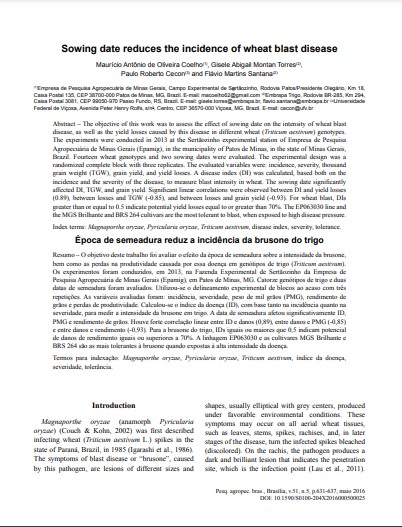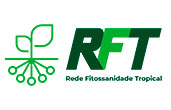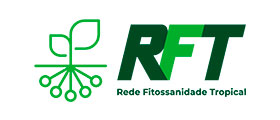
Sowing date reduces the incidence of wheat blast disease
The objective of this work was to assess the effect of sowing date on the intensity of wheat blast disease, as well as the yield losses caused by this disease in different wheat (Triticum aestivum) genotypes. The experiments were conducted in 2013 at the Sertãozinho experimental station of Empresa de Pesquisa Agropecuária de Minas Gerais (Epamig), in the municipality of Patos de Minas, in the state of Minas Gerais, Brazil. Fourteen wheat genotypes and two sowing dates were evaluated. The experimental design was a randomized complete block with three replicates. The evaluated variables were: incidence, severity, thousand grain weight (TGW), grain yield, and yield losses. A disease index (DI) was calculated, based both on the
incidence and the severity of the disease, to measure blast intensity in wheat. The sowing date significantly affected DI, TGW, and grain yield. Significant linear correlations were observed between DI and yield losses (0.89), between losses and TGW (‑0.85), and between losses and grain yield (‑0.93). For wheat blast, DIs greater than or equal to 0.5 indicate potential yield losses equal to or greater than 70%. The EP063030 line and the MGS Brilhante and BRS 264 cultivars are the most tolerant to blast, when exposed to high disease pressure.

A Rede Fitossanidade Tropical (RFT) é uma iniciativa brasileira de trabalho cooperativo, com objetivo de gerar e transferir informações relevantes, baseadas nas descobertas em pesquisas aplicadas numa importante subárea das ciências agrárias e agronomia, a fitossanidade.
Últimas notícias
Menu
Contato
Se tiver alguma dúvida ou quiser conversar conosco sobre parcerias e oportunidades, envie-nos um e-mail. Teremos o maior prazer em responder.
-
contato@fitossanidadetropical.org.br

